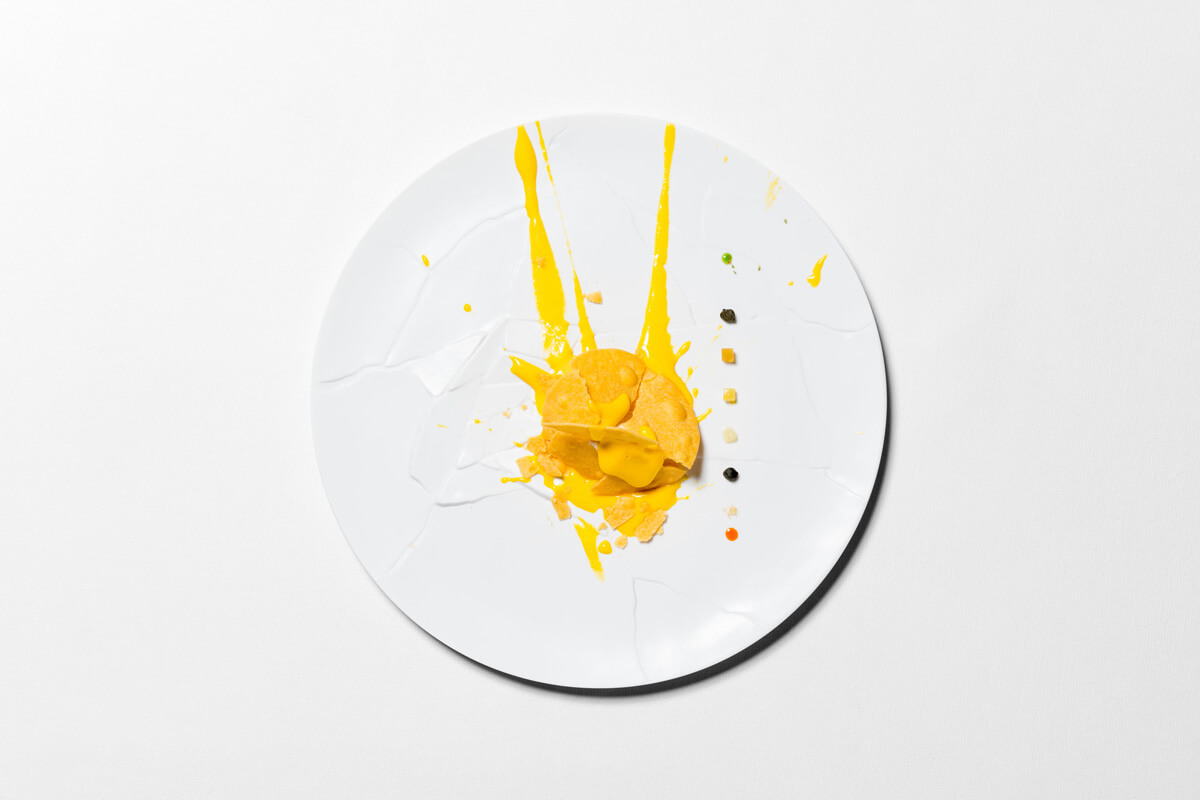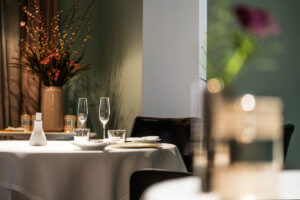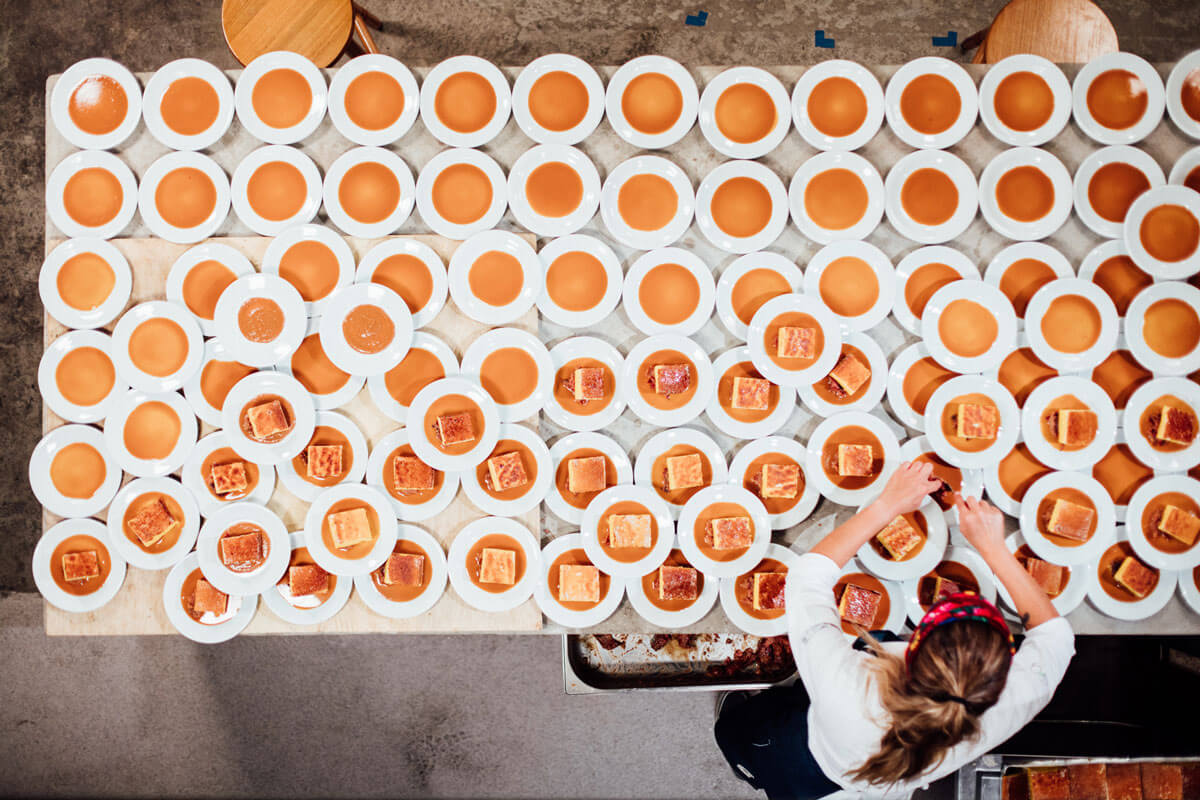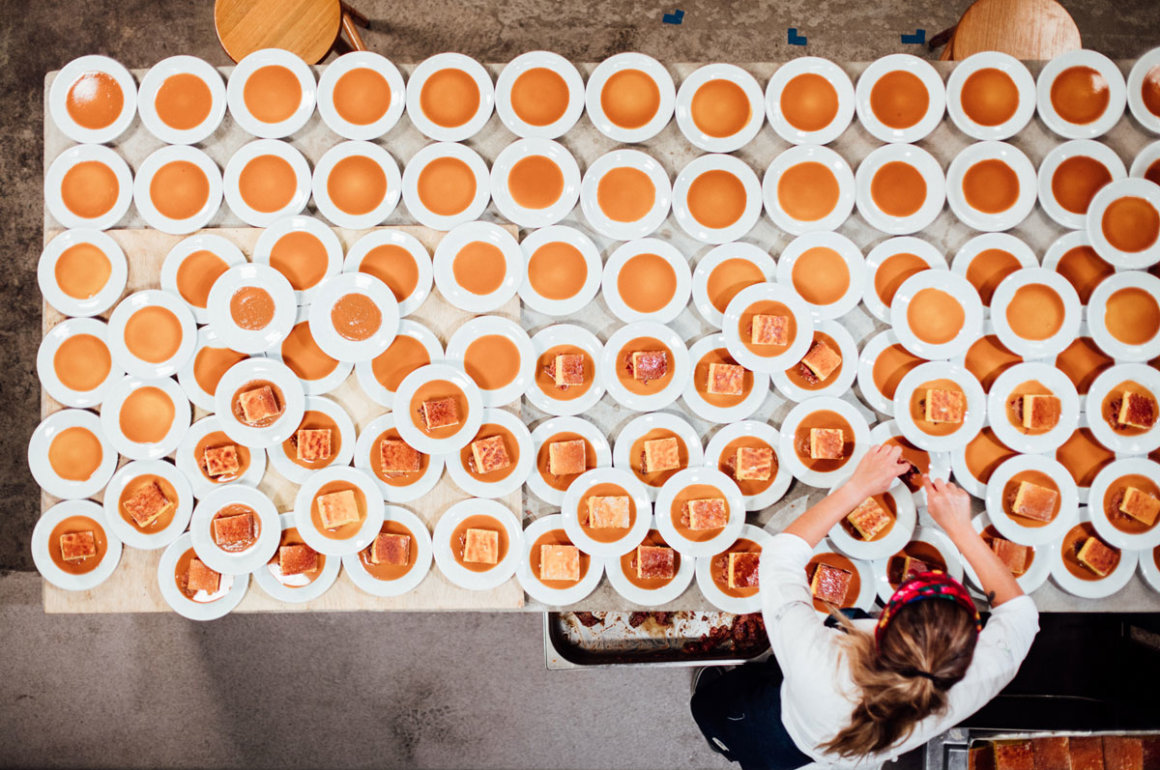
The crunchy part of lasagne. Massimo Bottura at Geneva Motor Show 2017
Massimo Bottura has the world at his feet: his three Michelin-starred Osteria Francescana in Modena, Italy, achieved the ultimate award in 2016, being voted best restaurant in the world in the prestigious San Pellegrino awards. And yet, rather than open multiple clones in parts of the world where wealthy foodies cluster, he is focusing on helping the needy – and cutting down food waste. Starting at the EXPO World Fair in Milan in 2015, Bottura has been setting up mini-gastro temples using ‘recovered food’ – ingredients that other food operations would otherwise throw away – with the proceeds going to charity.
His next, and most ambitious, cultural-social project using ‘recovered food’ will be the Refettorio Felix in London in June, with the collaboration of Alain Ducasse, Angela Hartnett, Daniel Boulud, Giorgio Locatelli, Jason Atherton, Michel Roux Jr, Nuno Mendes, and numerous other star names from in and around the capital. Darius Sanai spoke to the super-chef and brand ambassador for Maserati (the luxury car company also hailing from Modena) about his passions and plans.
LUX: Your original inspiration for these projects came from a childhood recipe for food that would otherwise be thrown away..
Massimo Bottura: The one that I developed specially for the project in Milan is called ‘Bread is Gold’. It’s what I thought as a child, the best bite before going to bed was a big cup of milk with breadcrumbs, sugar and a bit of chocolate or coffee (depending on what was left). For me it was the best meal as a kid. So we developed this beautiful dessert about bread, milk and sugar that we presented.
Another very simple example that we created (in Milan) was the breadcrumb pesto. All these people were passing through and they needed energy. And they were asking for pasta. So I said okay – tomorrow I am going to cook pasta for you. And because I saw some basil, I was thinking of making pesto.
I went to the kitchen the next day, and there wasn’t a lot left, only one case, which for 100 people is nothing. So I started thinking…I took out all of the herbs thyme and mint which matched perfectly with basil, and I start putting in some Parmigiano Reggiano cheese and some extra virgin olive oil. But I was missing the pine nuts, and I couldn’t go and buy them because they were too expensive [for the project]! So, I had an idea – I put everything in the blender, with a little bit of garlic and then I started adding very cold still water. If I keep the mixer at low temperature there is no oxidation with the extra virgin olive oil. Then, instead of putting pine nuts, I used breadcrumbs by grating the leftover bread from two days before. Then I strained with a strainer, got all the impurities out, and then I re-grated it. It got very creamy but extremely light because the only fat was the extra virgin olive oil and it came out as an amazingly creamy basil pesto with breadcrumbs! Then I rescued all the herbs we had, and the mint (it was summer) gave the freshness. We served it to 100 people. It was one of the biggest hits of the summer.

“Oops I dropped the lemon tart”. Dessert at Osteria Francescana. Image by Callo Albanese & Sueo
Read next: Spring in the world’s most romantic city at Hôtel Plaza Athénée
LUX: As a chef, you like to be innovative. Is that the right word?
Massimo Bottura: Contemporary. I think it’s more contemporary. Osteria Francescana is the place where we develop ideas. It’s like the bottega del rinascimento: the renaissance story where the master gives the ideas to develop and to the guys who are working together as a family and we create culture everyday. We develop, and we bring tradition to the future.
We are also ambassadors of agriculture. And you know in Italy we are crazy and obsessed about the quality of the ingredients. And then we also train people: we have thousands of CVs from people waiting to come and learn from Osteria. And then tourism – we developed tourism for the first time in history in Modena, tourists from all over the world. They speak English, Japanese, Chinese and Spanish. People come to see where Osteria is, matching with the people coming to see Maserati and Ferrari [in nearby Maranello]!

Massimo Bottura at Geneva Motor Show 2017
LUX: You haven’t tried to create copies of Osteria around the world. Why is that?
Massimo Bottura: Because I believe in it. Because excellence and quality is one. And when I am in Modena I have to be there and be respectful of all the people who come from all over. Of course I have to travel because I have to spread ideas and explain the word and my point of view. Yesterday at my conference in Milan there were around 5,000 people, listening to me. People like the CEO of Gucci to the Mayor of Milan from the Minister of Agriculture to the most important journalists. It’s about that too. It’s not just about the quality of the ingredients, it’s about the quality of the ideas that’s the most important thing.

Osteria Francescana. Image by Callo Albanese & Sueo
Developing different restaurants is all about making money, and we have enough. We don’t need a private jet or a helicopter on a big boat. To me personally, it is much more satisfying to give joy to people and because I am a chef you cook for others to give joy and transfer emotion. Even in this social project, it is all about culture. Knowledge consciousness and sense of responsibility. The sense of responsibility is not about to getting rich but to give back after having all of the success that I’ve had.
LUX: Tell us more about your ‘Soup Kitchen’ projects.
Massimo Bottura: They are are not a charity project, they are a cultural project because I involve all the best chefs in the world to cook the waste from supermarkets and other restaurants. It is enormous. The mayor of Tokyo said he would love a project like that in place for the Tokyo Olympics. The United Nations, hospitals in New York..we are working on all these things. The next one will be the Reffertorio Felix in London in June.
We involve artists, designers, architects to build beautiful spaces and to rebuild the dignity of the people. It’s not about serving just some hot food – that’s fine and beautiful. But this is a different project. I am doing different things, with a different perspective. For me, inside a beautiful space I can rebuild something. Dignity of people, or give pride to the food that has been considered waste for 99.99% of people. Through my knowledge, and through our knowledge, because it’s a project that involves all of the best chefs in the world.
I can see the reaction of people around the world which is so interesting. Numbers are numbers. 160 million people are starving. 1.4 billion are overweight and 1.3 billion tonnes of food is wasted every year. 33% of food production is wasted. It’s 50% in Brazil. Every single day in Rio de Janeiro 10 food trucks full of food are burnt. Vegetables and fruit. Why? Because…I don’t know. There is no explanation. It’s not about producing more, it’s about wasting less.

Refettorio Gastromotiva. Image by Angelo Dal Bo
LUX: Is the Soup Kitchen business sustainable? Do you need support? How does that work?
Massimo Bottura: We need local partners like we had in Rio, Gastromotiva; in Milan Caritas. We need a local partner that takes care of everyday life, so that every single one is sustainable. In Rio de Janeiro they are selling the space for companies to hold meetings. They donate money to sustain the dinners. Caritas too is doing that.
There is zero food waste in Osteria and we develop ideas in our everyday life and project these ideas into the soup kitchen all over the world. Now there is a beautiful movie that is coming out from the experience in Milan. There is another one that is in production for the experience in Rio. There’s Anthony Bourdain supported by the Rockefeller Foundation that is going to presented at the Tribeca film festival. There is book; we signed yesterday with Phaidon. A beautiful book about 150 recipes on waste – what you can do with an over ripe banana with some breadcrumbs or some ugly tomatoes – you can do beautiful, beautiful things. And these are ideas that have to be spread everywhere.
Read next: William Fan on the androgynous future of fashion
LUX: What is your idea of achievement? What are you satisfied with?
Massimo Bottura: Next, I want to build a university. I want to build a university in the most amazing villa outside of Modena. It’s abandoned. Now we have started restoring it with Emilia Romagna’s regional government and the Minster of Agriculture. It was an old villa with a full circle of life. There is small place to make two different wheels of parmigiano every day. There is a vineyard for the balsamic vinegar. There is the land all around for pasture.
LUX: What will the future bring for food?
Massimo Bottura: I think in the future the most important ingredient is culture. The chef will know more about soil, and the farmers of the future will know more about taste. Growing up together, studying together.
Donate to Food for Soul at www.foodforsoul.it
Our thanks to Maserati for the interview www.maserati.com







Recent Comments